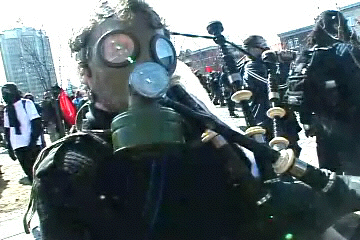7:30 pm, Sunday 12 October @ the Locomotive Pub, 44 Mill Road, Cambridge "Trading Freedom: the secret life of the FTAA" offers an explanation of the Free Trade Area of Americas, a proposed economic zone that will regulate the economic activity of one-sixth of humanity, overriding local democracy in favour of "rights" for multinational corporations throughout the Americas. This film is the story of those who resist - indigenous struggles, working-class organizations, women in rebellion, media activists, and a huge network of NGOs.
"Footage from Chiapas, Quebec City, Sao Paulo, Akwesasne and Tijuana, plus the combined efforts of over 100 videographers, photographers, free radio outlaws, writers, editors, techs, and rabble-rousers make this the perfect evening out." -- Luther Blisset Suggested donation 2 squid.
Download and distribute a
poster for this event.
The Free Trade Area of the Americas (FTAA), currently being negotiated by 34 countries of the Americas, is intended by its architects to be the most far-reaching trade agreement in history. Although it is based on the model of the North American Free Trade Agreement (NAFTA), it goes far beyond NAFTA in its scope and power. The FTAA, as it now stands, would introduce into the Western Hemisphere all the disciplines of the proposed services agreement of the World Trade Organization (WTO) - the General Agreement on Trade in Services (GATS) - with the powers of the failed Multilateral Agreement on Investment (MAI), to create a new trade powerhouse with sweeping new authority over every aspect of life in Canada and the Americas.
The GATS, now being negotiated in Geneva, is mandated to liberalize the global trade in services, including all public programs, and gradually phase out all government "barriers" to international competition in the services sector. The Trade Negotiations Committee of the FTAA, led by Canada in the crucial formative months when the first draft was written, is proposing a similar, even expanded, services agreement in the hemispheric pact. It is also proposing to retain, and perhaps expand, the "investor-state" provisions of NAFTA, which give corporations unprecedented rights to pursue their trade interests through legally binding trade tribunals.
Combining these two powers into one agreement will give unequalled new rights to the transnational corporations of the hemisphere to compete for and even challenge every publicly funded service of its governments, including health care, education, social security, culture and environmental protection.
Why does this matter to Cambridge? If the treaty is ratified, the FTAA will become a new benchmark for all future world trade negotiations. Capital flows so freely within the global economic system that the FTAA will place enormous pressure on countries within the European Union to follow suit, lowering social investments, further attacking labour standards and union protections, and making it impossible to enforce local environmental regulations or fight introduction of GM foods. It's also a cracking good film. Luther liked it, and so will you!
